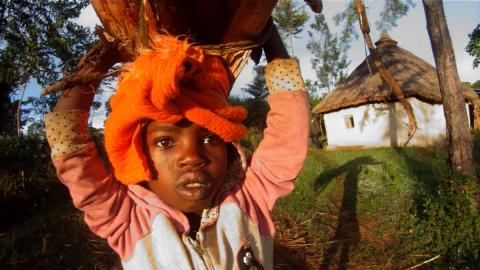
Carbon for Water is the name of both a life-changing program in Kenya and a 21-minute film about the project that was shown at Toronto’s Planet in Focus Environmental Film Festival on Sunday afternoon.
Kenya’s Western Province has been undergoing a human and environmental crisis due to deadly but preventable diseases originating from water in local rivers that’s used for a variety of purposes and has become unsafe to drink. People boil water to purify it, but that requires wood to make fires and has resulted in young children missing school so they can gather firewood and major deforestation. Smoke from fires inside houses causes health issues and high CO2 emissions, while fewer trees in the region contributes to less precipitation, which causes its own problems. It’s a multi-faceted issue — especially in a country with a rapidly growing population — in desperate need of viable solutions.
American filmmakers Evan and Carmen Abramson made their first documentary, When The Water Ends, last year. It dealt with deadly conflicts over water taking place in East Africa and led to a dialogue beginning between the filmmakers and executives from Vestergaard Frandsen, a European company specializing in disease control products that was launching the $25-million Carbon for Water program to distribute its LifeStraw Family water filters to 90 per cent of the households in Western Kenya.
“The company is very unique because it makes money but it also helps people,” Evan tells www.samaritanmag.com. “The film is a documentary mostly told through eyes of Kenyans who are experiencing these environmental health pressures and whose lives have been changed by the Carbon for Water campaign.”
The film looks at a five-week campaign launched in April that involved 4,000 health workers and 4,000 drivers distributing 900,000 filters to enable 4.5 million people to drink clean water without having to boil it. Carmen (also credited as Carmen Elsa Lopez, her maiden name) says they noticed a reduction in typhoid in just a few days after people started using the filters.
The filters, which cost about $20 each to produce, are paid for by trading carbon credits in the international market. Each filter delivers at least 18,000 litres of quality drinking water, which is enough to supply a family of five for at least three years. Since Vestergaard Frandsen only gets paid for the emissions it reduces, it has a strong incentive to invest the revenue it earns back into the program so it can maintain and replenish the filters (at no charge) for at least 10 years and educate residents on proper and consistent usage.
Several thousand Kenyans have been employed during start-up, and several hundred will continue to work on annual monitoring, education and maintenance activities.
Carbon for Water is the largest water treatment program in the developing world paid for by carbon credits and is projected to cut CO2 emissions by two million tons per year for a decade.
“We think companies have so much control over what’s happening with the environment that changes should come through them,” says Carmen. “This is a perfect example of a company that is taking a lot of risk on something that had never been done before on this scale. Once we saw what they were going to do to help 4.5 million people, we thought that making this film was a great way of showing the world and business leaders that they can do this.”
The film is being shown to the United Nations Environmental Programme and a number of non-governmental organizations in Geneva, Switzerland this week. The goal is to promote the program so that it can be implemented in other territories and advocate for the renewal of the carbon trading aspect of the Kyoto Protocol, an international agreement on reducing greenhouse gas emissions that will have its first commitment period end next year.
“If the Kyoto Protocol is renewed, then we can see these projects in other places in the world,” says Carmen.
Since more than 1.2 billion people (most of them in developing countries) lack access to clean drinking water, it’s essential that programs like Carbon for Water are allowed to continue and expand.
Pharrell adidas NMD Hu Black GY0093 Release Date